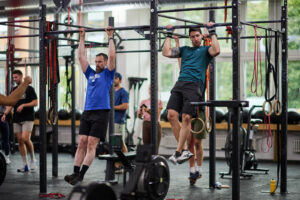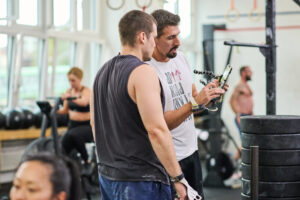
Stress is unavoidable but how stress impacts fitness is not common knowledge. Stress part of life—especially if you’re juggling a demanding job, a family, and the desire to stay fit. At CrossFit Kreis 9, we see many high-performing adults who excel in multiple areas of life. But we also see what happens when stress goes unchecked: results stall, motivation dips, and people start to wonder if their training is “working.”
Here’s the truth: stress doesn’t just affect your mood or sleep. It impacts your fitness, your recovery, and your capacity to adapt to training. The good news? You don’t have to stop training altogether. But you do have to train smarter—and recognize the signs before it’s too late.
Stress and your body: a complicated relationship
Stress itself isn’t bad. Physical training is a form of stress. Your body responds by adapting: getting stronger, faster, more resilient. But this only works when it has a chance to recover.
Chronic stress—from work, life changes, sleep deprivation, emotional strain, or even too much high-intensity training—keeps your nervous system in overdrive. This leads to prolonged cortisol elevation, which can disrupt nearly every system in your body. How stress impacts fitness is individual but here are some common issues:
- Sleep becomes shallow or fragmented
- Recovery slows down
- Motivation takes a hit
- Fat loss stalls
- Muscle gain becomes harder
- You feel sore longer, and small injuries linger
You might feel like you’re doing everything “right”—eating well, training often—but you’re stuck. This is your body waving a red flag.
From stressed and wired → to stressed and tired
We call this the stress continuum. Most people don’t realize they’re on it until they’ve slid too far.
- Stressed and wired
You’re alert, energized, maybe even crushing your workouts. But under the surface, your body is running on adrenaline. You’re edgy, your sleep is light, and you crash hard when you stop. You’re using training to stay functional. - Stressed and tired
Now the engine’s burned out. You’re fatigued, unmotivated, and sore all the time. Even warmups feel hard. You may feel mentally flat, too. This is the stage where results drop off—and people start skipping workouts.
But here’s the thing: you don’t have to slide all the way down the continuum. If you recognize the signs early, you can adjust your approach and stay in the game.
Adapt, don’t quit
There are seasons in life when training goals need to shift. Maybe you’re going through a heavy workload, caring for a sick family member, or navigating a major life transition. These are not times to quit training—they’re times to reframe what training looks like.
You should only stop training when you’re medically forced to—and it should never come to that.
What should you do instead?
Lower the intensity
Not every workout needs to be a grind. Dial back to 70% effort. That’s not failure—it’s smart programming for a stressed body. Let movement support your recovery, not fight against it.
Focus on consistency over performance
You don’t need to win the workout. You just need to show up and move. Your nervous system thrives on rhythm. A few moderate sessions each week are far better than swinging between all-out intensity and total rest.
Keep your body in motion
When stress is high, movement is medicine. It boosts circulation, improves sleep, and stabilizes mood. Walk, stretch, lift, breathe—keep moving, even if it’s not PR-level work.
Talk to your coach
Our goal review conversations aren’t just about progress—they’re a place to be honest about where you’re at. We’re here to help you pivot and train with purpose, not guilt.
Training is for life—not just for progress
Fitness isn’t about always pushing. It’s about adapting.
Sometimes, you’ll be on fire. Sometimes, you’ll be holding it together with coffee and willpower. Either way, movement should stay in your life. It doesn’t need to look the same every season—but it should never disappear.
At CrossFit Kreis 9, we believe in coaching people, not just programs. That means adjusting to you, in real time. If you’re in a tough season, the answer isn’t to quit. The answer is to train differently—with support, intention, and a long-term mindset.
Because movement matters. Winning the workout? Not so much.




